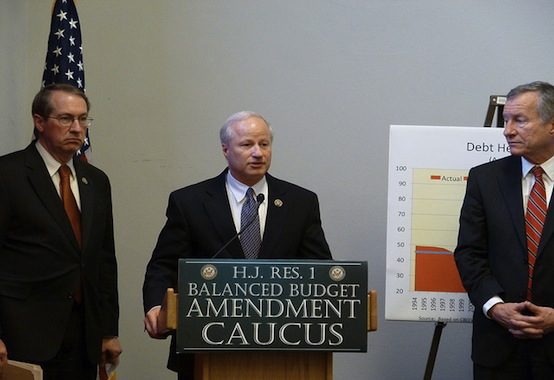The Balanced Budget Amendment Rears Its Farcical Head Again

After the unsatisfying conclusion of the fiscal cliff saga, House GOP leaders resolved to reestablish regular order in the consideration of fiscal policy. No more secret negotiations with the White House. No more eleventh-hour crisis-averting votes. This was the impetus behind the bill to force the Senate to pass a budget for the first time in years, possibly paving the way for the first joint budget resolution since 2009.
A return to normalcy: what a splendid idea!
Which is why I’m scratching my head at the news that Republicans plan to make a balanced budget amendment to the Constitution the centerpiece of their fiscal agenda. The proposal would cap federal spending at 18 percent of GDP as well as require supermajorities for tax hikes and debt ceiling increases.
AEI’s James Pethokoukis deconstructs the practicality of the spending cap:
[L]et’s quickly examine whether capping federal spending at 18% of GDP is realistic. I am not sure it is. If the bill excludes interest spending? Maybe. If so, then the BBA would be capping spending at roughly the historical average of around 20% to 21% of GDP. But even doing that for the long term will be tough (especially without slashing defense spending to Europe’s minimalist levels). Recall that the Bowles-Simpson plan has a long-term spending target of 21%.
Just as problematic is the institutional folly that the BBA represents. Instead of reasserting democratic control over fiscal policy, as had been the plan until five minutes ago, a BBA regime would take us in the opposite direction — toward newly empowered judges. The literature on how a BBA would invite judicial interference into fiscal policy is vast — for a taste, see Ed Meese, Walter Dellinger, and Peter H. Schuck — and, to my lights, dispositive. But that’s not all. The executive branch, too, would potentially gain new authority over spending — which the Goldwater Institute, strangely, sees as a feature rather than a bug.
Then there’s the question of “optics.” Come the State of the Union Address, President Obama plans to grasp the mantle of restoring middle-class prosperity. Republicans are set to counter with the dry language of fiscal rectitude, behind which lurk accounting gimmicks and berobed men armed with calculators.
Is there a more self-defeating political strategy than this?
Comments